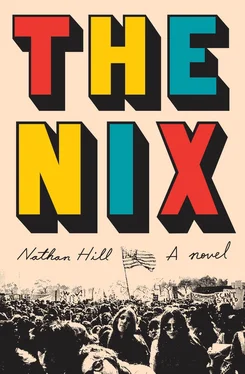“My scarlet dash, actually.”
Everything is easier when they dance. She takes to the floor and does the Twist. She does the Madison. She does the Mashed Potato and the Jerk and the Watusi. Faye’s teenage years have been consistently buoyed by new dance crazes that appear every few weeks on the Top 40. The Monkey. The Dog. The Locomotion. Songs and dances that enact a perfect circle — the song tells you everything you need to know about the dance, and the dance gives reason for the song. When Marvin Gaye sang “Hitch Hike,” she knew exactly what to do. When Jackie Lee sang “The Duck,” Faye could do it even before she saw it on TV.
So here she is, staring at the floor, doing the Duck in a blue charmeuse prom dress — lift the left leg, then the right leg, then flap your arms, then repeat. That’s what goes for dancing these days. Every prom and homecoming and Valentine’s Day dance is like this, the deejay playing a song that tells you precisely what to do. The big new thing this year is Archie Bell and the Drells singing “Tighten Up”—shuffle to your left, then shuffle to your right. “Tighten it up now, everything will be outta sight.” Somewhere nearby Henry is dancing too, but Faye doesn’t notice. These are dances meant to be done alone. When you do the Freddie, the Chicken, the Twist, even on a crowded dance floor, you do them by yourself. They aren’t allowed to touch each other and so they dance alone. They perform the dances that fit exactly what their chaperones want of them. They are told how to dance and they respond like proper bureaucrats, is what Faye thinks now as she watches all her classmates. They are happy, satisfied, soon-to-be-graduates, pro-authoritarian, their parents support the war, they have color televisions. When Chubby Checker says, “Take me by my little hand and go like this,” he is telling her generation how to respond to what is happening to them — the war, the draft, the sexual prohibitions — he is telling them to obey.
But then at the end of the night, the deejay announces he has time for one more song—“This one’s very special,” he says — and so Faye and Henry and the other students move slowly back to the dance floor, feet tired from all the shuffling and twisting, and the deejay puts on a new record and Faye hears the needle catch, the scratch before it falls into the groove, the static, and then comes this song.
It doesn’t even sound like music at first; more like some crude primeval screeching, the dense noise of strings all playing dissonant and muddy — a violin maybe, and some freakish guitar repeatedly striking the same chord — the slow, monotonous beat of a bass drum, the insistent reverb, the singer not actually singing but chanting. Faye can’t make out the words, can’t identify a chorus, can find no beat to dance to. A dreadful sexy moaning, that’s what it is. A phrase pops out: “Whiplash girlchild in the dark.” What does that even mean? Around her, the students move with the music, move as sluggishly and languidly as the music itself: They stagger toward each other, touch each other, grab each other by the waist and squeeze their bodies together. It is the slowest dance Faye has ever seen. She looks at Henry, who stands there worried and helpless while around him dancers wiggle like giant worms. How do they know what to do? The song gives no instructions. Faye loves it. She grabs Henry by the back of the neck and pulls him into her. Their bodies slap together. He stands there bewildered as Faye lifts her arms over her head and closes her eyes and turns her face to the ceiling and sways.
The chaperones, meanwhile, are wary. They don’t know what is happening but they are sure it’s wrong. They force the deejay to stop the song and the dancers groan. They walk back to their tables.
“What were you doing out there?” Henry asks.
“Dancing,” Faye says.
“What dance is it? What’s it called?”
“Nothing. It’s not called anything. It’s just, you know, it’s just dancing. ”
Afterward, Henry takes her to the park, a quiet neighborhood park near her house, unlit, private, one of the few places in this small town to be alone. She expects this. Henry is a boy who believes in romantic gestures. He pays for candlelit dinners and buys candy in heart-shaped boxes. He shows up at her house smiling like a jack-o’-lantern handing her fat bunches of lilies and irises. He leaves roses in her car. (That the roses shrivel in the heat and die, she never tells him.) Henry doesn’t know the meaning of the flowers, the differences between red roses and white, between a lily and an iris. This is a language he does not speak. He does not know how to love Faye creatively, and so he does what everyone else in high school does: candles and chocolates and flowers. He treats love like a balloon, like it is all a very simple matter of accumulation, just adding more air. And so the flowers keep coming. And the dinners. And the love poems that appear in her locker from time to time, typewritten, unsigned—
I love you with all my love
more than the stars above
“Did you get my poem?” he’ll ask, and she’ll say “Yes, thank you,” and smile and look at the ground and cross her feet and hope he doesn’t ask if she liked it. Because she never likes it. How could she like it when in her free time she’s reading Walt Whitman and Robert Frost and Allen Ginsberg? How ugly Henry seems compared to Allen Ginsberg! How simple and stupid, how quaint and provincial. She knows Henry wants to impress her and woo her, but the more of these poems she reads, the more she feels tranquilized, like her mind is sinking slowly into sand.
When you are away
I have the worst day
Because I can’t hold you
I feel real sad too
She can’t bring herself to criticize him. She’ll only nod and say, “I got the poem. Thank you,” and Henry will make that face — that grinning self-satisfied face, that triumphant face, that big stupid muffin face — which makes her so angry she wants to tell him cruel things:
That it would be a better poem if he wrote it in meter.
Or if he owned a dictionary.
Or if he knew more multisyllabic words.
(And how awful of her to even think that!)
No, he is a nice enough boy, a good enough boy. Good-hearted, bighearted. He is kind. Gentle. Everyone says she should marry him.
“Faye,” he says as they sit on the merry-go-round, “I think we’ve come a long way, you know, in our relationship.” And she nods but does not know exactly what he means. He has certainly given her lots of flowers and poems and dinners and chocolates, but he’s never told her a secret. She feels she knows nothing about him, nothing more than what everyone else knows: Henry, whose family owns the farm by the nitrogen plant, who wants to be a veterinarian, the football team’s mediocre tight end, the baseball team’s backup third baseman, the basketball team’s third-string forward, who on weekends fishes on the Mississippi and plays with his dogs, who sits quiet in class and needs her tutoring for algebra — Faye knows his résumé but not his secrets. He never tells her anything important. He never explains why, for example, when he kisses her he doesn’t act like a boy should, doesn’t try the things boys are supposed to try. She’s heard the stories — famous in high school — of boys who will do anything if you let them. Who will go all the way if you let them. And anywhere! In the backseats of cars or on the baseball field at night, in dirt or grass or mud or whatever cheap and lucky spot they find themselves when they find a girl who doesn’t say no. And the girls who let them, who invite it, who aren’t going steady, their reputations are massacred with that one whispered syllable: slut. The fastest word in the language. It moves through school like a plague. One has to be careful.
Читать дальше












